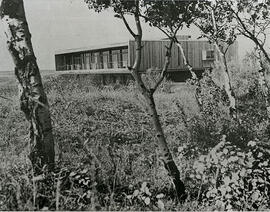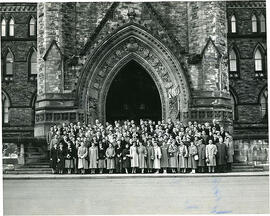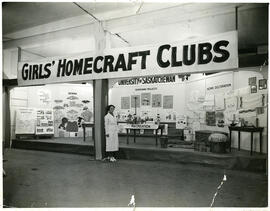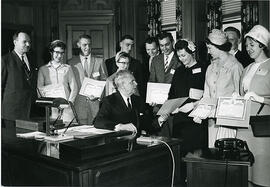- A-4040
- Item
- [after 1967]
Main building of Camp Rayner on Lake Diefenbaker, Saskatchewan; trees in foreground.
Bio/Historical Note: John George Rayner was born 1 Oct. 1890 in London, England. At age 2 his family came to Canada, settling on a farm near Virden, Manitoba. After completing his high school education there, he attended the Manitoba College of Agriculture in Winnipeg and graduated with a BSA in 1913. In 1914 Rayner was employed as agricultural representative with the Saskatchewan Department of Agriculture, his district taking in a large portion of the northwest part of the settled area of the province. With an appointment in 1918 as director of boys' and girls' club work at the Extension Department at the U of S in Saskatoon, Rayner began a 34-year association with the rural young people of Saskatchewan. He was dedicated to the principle of development of the individual, and was one of the founders of the Canadian Council of Boys' and Girls' work in 1933. Rayner served as the council's president in 1937 and 1947, and was instrumental in getting the name "4-H" applied to rural youth clubs in Canada. He served as director of the Extension Department from 1920 until the time of his death in 1952. Rayner was a charter member of the Canadian Society of Technical Agriculturists (now the Agricultural Institute of Canada) of which he became a fellow. He was also a charter member of the Saskatchewan Institute of Agrologists. In 1965 the 4-H Foundation's Camp Rayner was named in Rayner’s honour, and in 1973 he was posthumously named to Saskatchewan's Hall of Fame. John Rayner died in Saskatoon on 30 June 1952.






![[Farm Boys' Clubs] - Inter-Club Competitions](/uploads/r/university-of-saskatchewan-archives/f/c/0/fc0ddb83a7fa1771bc5876095a499adcbe91bd27ef47b374f47ee3fc53ea3500/a-2336_142.jpg)
